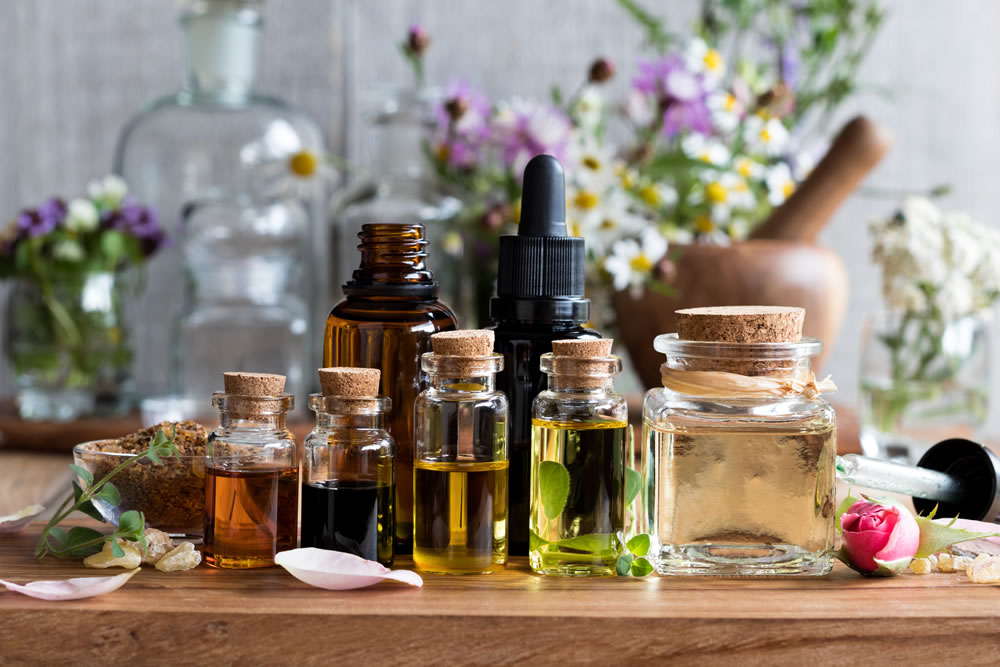Myrrh
Myrrh oil is perhaps one of the oldest and widely used essential oils in human history. It has a warm, slightly musty fragrance and comes from a small tree called commiphora myrrha that is native to Yemen, Somalia, and Arabia. The process of steam distillation of the oleoresin-gum from the tree is used to extract oil.
In aromatherapy, the oil is said to help fight insomnia, depression, and high blood pressure. You can set up your very own spa experience at home by rubbing the oil into your skin during a massage or pouring a few drops of myrrh oil along with some water into an oil diffuser or Neti Pot.
Alongside frankincense oil, myrrh is known to be an effective antimicrobial powerhouse that helps fight infectious bacteria in your body. The combined force of these two oils is said to be beneficial in the fight against cancer.
Thyme
Thyme is a plant in the same family as oregano, basil, and mint. The oil has a very sweet, strong herbal smell and is usually amber or reddish-brown in color. This ancient herb comes from an evergreen perennial shrub and was used for medicinal purposes by the Egyptians, the Greeks, and the Romans. Thyme oil is antibacterial, antiseptic, and extremely calming.
Thyme supports your immune system which means it is able to boost antibacterial properties in your system. Thyme is a wonderful natural decongestant that helps eliminate mucus and other forms of inflammation in your body. While ill with a disease as complex as cancer, any small illness can make life just that much harder.
Additionally, thyme oil is a superhero when it comes to balancing hormones in your body. The oil has been known to help balance progesterone in the body. It can also ease cramps from your period, delay menopause, and ease the symptoms of many female reproductive issues.
Thyme oil has also been known to induce death to breast and cervical cancer cells. You can easily use this beneficial oil at home by pouring a few drops into water or by giving yourself a loving massage.
Lavender
Lavender oil comes from lavender, which is a perennial evergreen plant that thrives in oceanic climates such as the Mediterranean, Europe, Africa, the Canary Islands, India, and the Middle East. Its floral fragrance is best known for reducing stress, but the essential oil also has medicinal properties that support the immune system.
Lavender has natural antifungal properties that are able to fight the overgrowth of sugars and yeasts like candida. Moreover, the oil is chock full of antioxidants that are able to fight free radical cancer cells that may be pervading your body. It also helps power your body’s naturally produced antioxidants such as glutathione, catalase and superoxide dismutase that are responsible for helping reduce oxidative stress and cancer-related traumas in your body.
To say the least, lavender oil has several benefits for cancer patients, including being effective as an anti-tumoral, providing relief of stress and anxiety, improving the function of the immune system, and offering pain relief.
Peppermint
The familiar fresh, sharp, menthol scent of peppermint oil comes from the perennial herb peppermint plant. The essential oil is extracted from the whole plant that’s above ground just before flowering, via steam distillation.
The oil has been known to provide respiration relief so if you are suffering from a cold or flu, peppermint oil can work for you. Peppermint oil works by decoagulating the mucus in your body so that it can be expelled for maximum breathing benefits. Moreover, the oil has several antiviral properties that help fight any disease that may invade your body and attack your immune system.
Peppermint also contains many anti-cancer agents, making it a valuable alternative protocol for cancer patients. The element menthol has been shown in studies to cause apoptosis or cellular death in tumors and help regulate healthy cell reproduction.
One belief system views peppermint oil’s benefits on the vibrational frequency level. Most diseases exist at 58 MhZ while the natural human vibration exists between 68 and 72 Mhz. Peppermint vibrates at 78 MhZ so according to this thought process, it can raise your body’s vibration up so it doesn’t operate on the same frequency as disease.
Black Pepper
One of the world’s oldest spices, black pepper dates back to the Ancient Greeks, Romans, and Egyptians. The seed was considered so valuable that it was a means of exchanging currency. Its dry, spicy, sharp, woody scent comes from the oil extracted from the fruit’s seed. Black pepper oil is a very effective protocol because it helps your body absorb nutrients better.
Black pepper oil has significant benefits when it comes to aromatherapy. The oil is unique with its warming abilities that make for comforting heated massages and relaxing moments. When it comes to the immune system, black pepper oil performs well. The oil contains powerful antioxidants called monoterpenes and sesquiterpenes that power your body’s antibacterial and antiviral properties, helping you fight free radicals.
Black pepper oil has “bio transformative effects” that help your body detox itself and better absorb the benefits from any other herbal protocols. This also aids in reducing inflammation in your body.
Additionally, the piperine and alkyl amides in black pepper have been shown to have properties that stop the growth of cancer cells and boost healthy cellular growth. To effectively use this as a protocol, you can add a few drops to a glass of water, a smoothie, a salad, soup, or even an entree for a flavorful antioxidant boost.
Cinnamon
Cinnamon oil is native to parts of South Asia, although it’s musky, spicy scent is well-known all around the world. The oil is extracted from the bark from the cinnamon tree through a process that includes drying the bark then steam-distilling it.
Cinnamon oil contains cinnamaldehyde that has antibacterial properties which help fight off infection, bacteria, and fungus while also reducing inflammation in your body. Additionally, the oil is said to help relieve stress and anxiety which can alleviate other ailments such as high blood pressure.
The oil helps boost your body’s natural antioxidant power through stimulating the immune system.
In addition, there are numerous compounds present in cinnamon oil that are valuable in fighting cancer. Cinnamaldehyde, cinnamic acid, 2-hydroxycinnamaldehyde, 2-methoxycinnamaldehyde, and eugenol have been proven to have anti-tumorous properties that serve your body by killing the cancer cells and helping your body effectively reproduce healthy cells.



